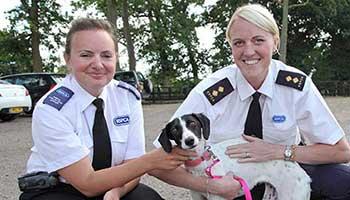Government drops farm cages ban breaking 15th promise for animals
04.10.23
The UK Government has quietly dropped plans to consult on banning cages for farm animals - one of 15 broken promises the RSPCA is urging the Prime Minister to act on this World Animal Day.
The latest U-turn saw his UK Government quietly drop plans to consult on banning cages for laying hens and farrowing crates for pigs leaving millions of farm animals confined to cages.
This comes despite the public's overwhelming opposition to cages. A brand new survey commissioned by the RSPCA has found that 84% of the public oppose cages for laying hens, over half of people hadn't heard of farrowing crates but when shown a picture of the conditions the pigs are kept in - 78% of people were opposed to them.
Currently, around 10 million hens live in cages in the UK which gives them on average less usable space than an A4 piece of paper. Around 60% of UK sows (about 200,000) are kept in cramped farrowing crates just before giving birth and for around four weeks after their piglets are born. These metal crates are so small that the sows can't even turn around.
Emma Slawinski, director of policy at the RSPCA, said: "We are so disappointed to see the UK Government quietly dropping their promise to ban cages for hens and pigs this summer. This was the final straw following a litany of broken promises for animals.
"The UK Government says it remains committed to leading the world in animal welfare, but they have continuously back-tracked on vital animal welfare issues from pigs through to puppies."
Four years ago, the then Prime Minister, Boris Johnson said on the Downing Street steps that he would "promote the welfare of animals" as a cause "so close to the hearts of the British people". This was followed up by putting nine specific promises into the 2019 Conservative manifesto but unfortunately all of these and more have now been dropped. This includes vital issues such as tackling the cruel puppy trade, stopping the imports of dogs with cropped ears, live exports, banning imports of fur from cruel fur farms and many more.
Emma added: "The Prime Minister is due to address party members, supporters and key decision-makers today, on World Animal Day, at the Conservative Party Conference. But he will take the stage with the UK Government's once-promising animal welfare agenda in tatters. We would urge him to use today to make good on those promises and get their animal welfare agenda back on track."
Full list of 15 broken promises
1) Caged farm animals - The UK Government had promised to consult on banning laying hens and pigs from being kept in cages in England but this has now quietly been dropped.
2) Live exports - the UK Government committed to banning live exports of farm animals for further fattening and slaughter as part of the Kept Animals Bill before it was dropped, after the legislation spent over 550 days in limbo. Although no such animals have been exported since 2020, exports could resume at any time. Once an animal leaves the UK they could face an endless gruelling journey that can last days, causing suffering and go on to be slaughtered in ways that would be illegal in the UK.
3) Livestock worrying - this was also part of the dismantled Kept Animals Bill, and would have given police extra powers to provide protection to livestock against dog control and bite incidents which can result in serious injuries and even death.
4) Puppy smuggling - the Bill was also set to increase the age of imported puppies to six months, afford greater protection around the import of pregnant dogs and limit the number of dogs an individual or vehicle can bring into the UK, in an effort to crackdown on the illegal and cruel puppy trade. Mums and puppies are still forced to travel long distances and sold to unsuspecting members of the public who often have to deal with poorly puppies and dogs with behavioural issues.
5) Imports of fur from abroad - fur farming has been banned in the UK for more than 20 years but sadly fur can still be imported from countries where animals raised for their fur often live in cramped, barren cages – with little ability to exhibit natural behaviours - and some are killed in horrific and inhumane ways. An RSPCA survey showed that 95% of the public would never wear real fur, but many items for sale in the UK are either incorrectly labelled or not labelled at all and without a ban on imports this is set to continue.
6) Sale and import of foie gras - this product can only be made through a process that is very cruel to ducks and geese. Production of foie gras has never occurred in the UK and was essentially banned as long ago as 1968, but despite pledging to ban imports of foie gras, this has now been allowed to continue.
7) Trade negotiations with high welfare standards - the UK Government vowed to safeguard high animal welfare standards in free trade agreements following Brexit. However, it has now signed three Free Trade Agreements (Australia, New Zealand, Trans Pacific) none of which included measures to ensure imports met the UK's animal welfare standards.
8) Food labelling consultation - plans for a consultation into mandatory welfare labelling on animal products was recently abandoned. Currently, consumers cannot make an informed choice because there is no clear labelling on the products they buy to show how the animal has been reared and cared for. This comes despite four out of five people* thinking having some knowledge about the way an animal has been cared for is important when making a purchase.
9) Pet theft - following a recommendation from the Pet Theft Task Force, the UK Government added pet abduction to the Kept Animals Bill which would have made pet theft a specific offence. Pet theft is devastating for owners who understandably see their pet as one of the family but currently the law treats the theft of a pet the same as the theft of a mobile phone.
10) Banning the use of shock collars - following a consultation showing overwhelming support for a ban on shock collars in England the Government introduced legislation in April to achieve this. Whilst it was quickly approved by the House of Lords it has stalled and has yet to be introduced to the Commons. Although we are yet to see an actual backtrack we're concerned that this too could be abandoned, despite Wales having a ban since 2010.
11) Call for evidence on snares - the UK Government committed to launch a call for evidence on the use of snares in England but this was sadly dropped. The RSPCA is opposed to the manufacture, sale and use of all snares and any traps which cause suffering to an animal - and these devices were recently banned by the Welsh Government. Foxes are often the target of such traps, but also other animals such as badgers and domestic cats can be potential victims.
12) Renters (Reform) Bill - renters in England were set to be given a legal right to request their pet lives with them - ending "blanket bans" on the keeping of beloved companion animals in many rental homes. However, plans have not been taken forward - meaning landlords can still unreasonably refuse a tenants request to keep a pet in their home without needing to provide a justifiable reason. Although we are yet to see an actual backtrack we're concerned that this too could be abandoned.
13) Review of slaughter legislation - the Government committed to reviewing the slaughter legislation but no progress has occurred on this despite the Government agreeing that lobsters and crabs are sentient animals and need to have protection when being killed and that fish need specific regulations on slaughter.
14) Importation of dogs with cropped ears - despite being illegal, more than 1,100 dogs are reported to have undergone this cruel and unnecessary procedure in the last three years. Many also take advantage of the loophole as it is not illegal to import dogs with cropped ears despite these dogs suffering mutilations, often by untrained individuals without pain relief. The law would also have seen a ban on importing declawed cats - also illegal to carry out in the UK.
15) Consultation on game birds - the Government promised a consultation on updating the standards on keeping game birds but no progress has occurred whatsoever.
Following the abandonment of these 15 pledges, the RSPCA hopes that many could be revived - either through UK Government commitments in the upcoming King's Speech, or if Members of Parliament bring forward backbench legislation due for a ballot later this year.
This November, MPs will get the chance to join a ballot to try to introduce the laws they think are important. This means elected representatives still have time to make change happen for animals.
The RSPCA is therefore urging the public to contact their MPs and tell them that they must act now to help animals. Lobby your MP today.


